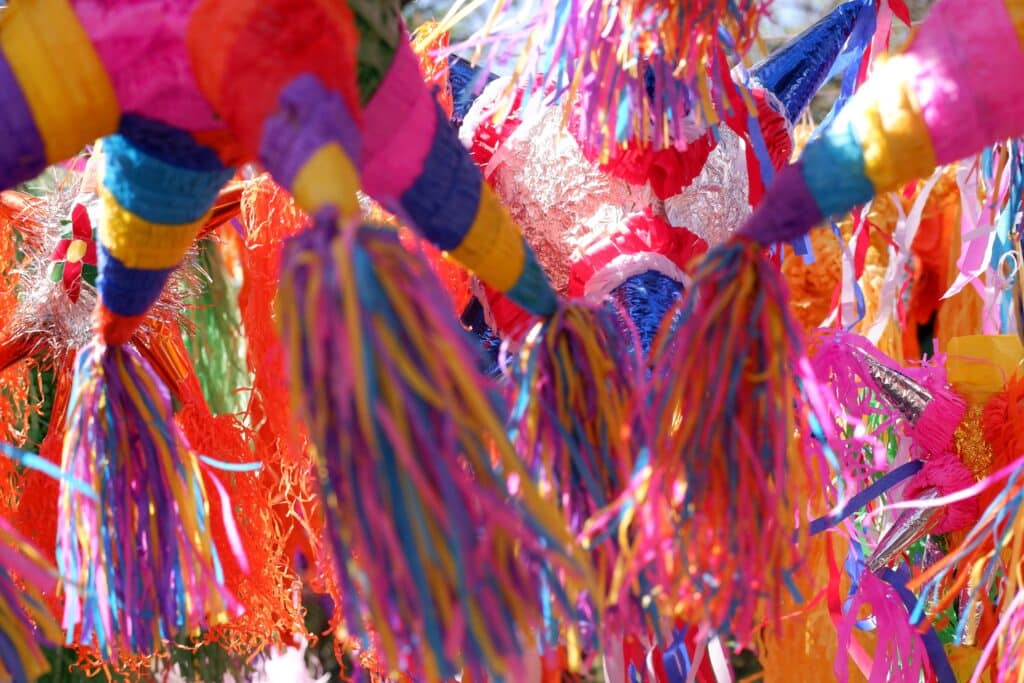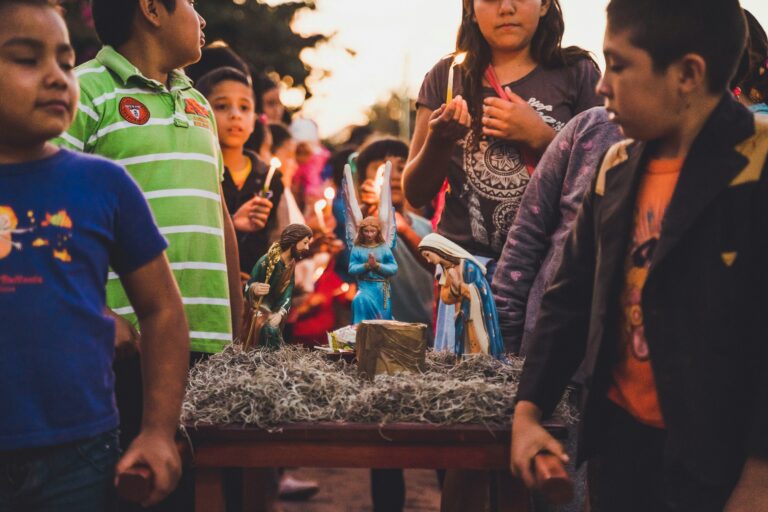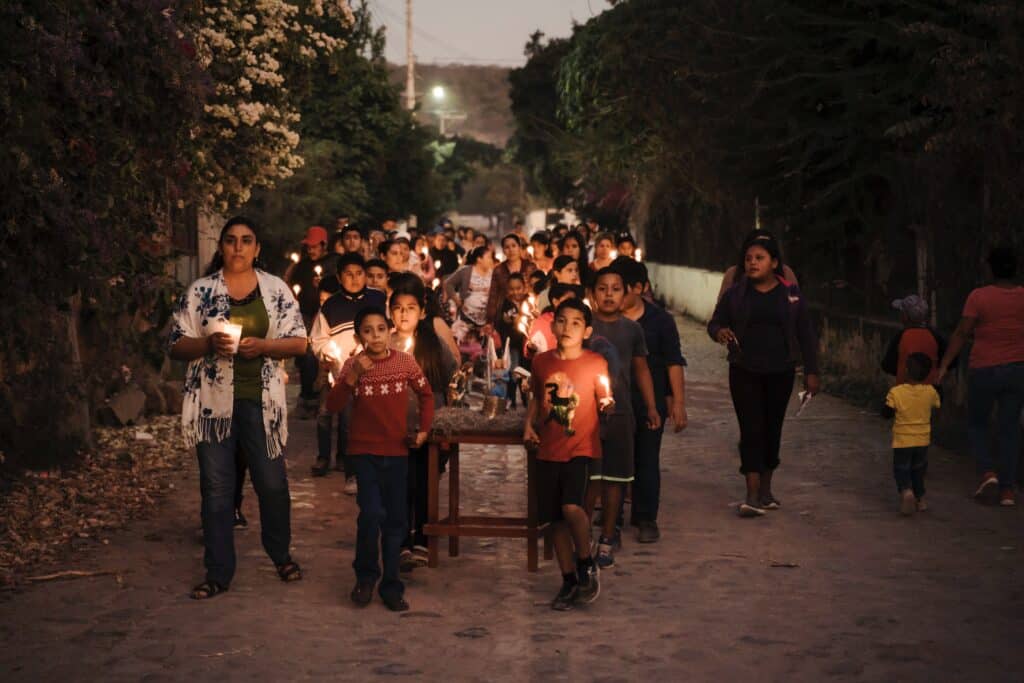Las Posadas (Spanish for “The Inns”), celebrated every year from December 16-24 in Mexico, Latin America, and some regions of the United States, are a Catholic holiday and religious celebration. The festivity showcases the journey of Joseph and Mary, traveling from Nazareth to Bethlehem in search of a secure place for Mary to give birth.
Many Mexicans associate the word “posadas” with gatherings of loved ones throughout the winter months to sing Christmas carols, share a hearty meal, and spread festive pleasure. Read more about Las Posadas traditions and what Remitly gathered so you, too, can learn about this Mexican fiesta.
Historical Background
Las Posadas has a long history in Hispanic culture. Although it began in Spain, Mexico has been celebrating it annually for more than 400 years and is said to have begun as a way to teach native people about Christmas. Posada celebrations began in churches, and later it was celebrated at haciendas and then in family houses, becoming the current festival by the 19th century.
The Augustinian friars of San Agustin de Acolman, near Mexico City, may have started posadas. Friar Diego de Soria, the Augustinian prior, received a papal bull from Pope Sixtus V in 1586 to celebrate ‘Misas de Aguinaldo’ or ‘Christmas extra masses’ from December 16 to 24.
The tradition is said be one of many ways the Catholic Church in Mexico was altered to help indigenous people understand and integrate it. The winter solstice fell on the same day each year, which was the Aztec ritual of celebrating their god Huitzilopochtli.
Neighborhood committees now organize posadas and a different family hosts each night. Other neighbors provide food, sweets, and piñatas to share party costs with the host family.
Las Posadas Meaning
One of the most beautiful and unique parts of Las Posadas is the significant and intentional nine nights of celebrations that connect to the Nativity story as we lead up to Christmas. The nine nights represent Mary’s nine months of pregnancy, starting on December 16 and ending on December 24.
One family offers to host the pilgrims each night, and so it begins: at twilight, a group of devout people parade through the streets, many of them carrying small angels and shepherds costumes. The Los Posadas celebration includes lit candles, religious figures, and imagery.
A child dressed as an angel leads a parade across town each evening during the festival. Adults, including musicians, follow as children in silver and gold robes carry candles and models of Mary and Joseph on a donkey and visit homes to request accommodations. Again, the procession is denied lodging, but households typically provide refreshments.
Finally, travelers can enter. Prayers and music continue, and joyful treats are exchanged. The evening concludes with a star-shaped piñata.
Las Posadas Symbols
As is true for many religious celebrations, every part played has a very intentional application. This is no different here, where the parties are joyous occasions and every piece of Las Posadas symbols hold special meaning. Let’s take a look…
The participants: Mary, Joseph, the shepherds, and angels
Because Las Posadas symbolize Joseph and the Virgin Mary’s journey from Nazareth to Bethlehem to give birth to Jesus, their presence is vital. An angel leads a pregnant Mary and Joseph through a neighborhood or village while shepherd-dressed children accompany them, indicating those who stayed with the couple before Baby Jesus’ birth.
The nativity scene, search for posada, and the role of candles
On street processions, participants carry lighted candles around a neighborhood lined with farolitos and ask for “posada” (room at the inn) by knocking on doors using a specific posada song. Local children usually dress as nativity story characters and stay closeby as the journey moves along.

The piñata
At the end, there is a colorful star-shaped piñata that has seven different cones to represent the seven deadly sins. The star shape depicts the Star of Bethlehem which guided the Three Wise Men and shepherds to Jesus’s place of birth, who came to worship the baby and bring him gifts. The piñata is commonly filled with candy for children to hit with a stick and break open to release the goodies that represent God’s blessings. In more old-fashioned celebrations you may find them filled with small fruits, cookies, and peanuts.
Traditional foods
Holiday food brings people together in joy and harmony. It’s the a time of year we can eat rich, warm soul food without thinking twice, and Las Posadas food and drink is absolutely some of the best.
Tamales, pozole, ponche, and churros are among the numerous symbolic Posada meals. Family and friends work together to make and roll dozens of tamales for the community, creating sense of togetherness. Pozole, a Mexican stew cooked with chicken or pork, chili spices, and garlic, provides warmth and the cozy feeling holidays can hold. Churros are as much a part of Mexican Posadas as the ritual, and they can be found in 7-star pinatas to make the kids further enjoy the activity.
Food has such an extroadinary way of bringhing people together and warming our bodies from the inside out during the holiday season.
The Nightly Processions and Songs of Las Posadas
As discussed, the procession during the nine nights leading up to Christmas Day, is what portrays the true meaning of Las Posadas. Interacting with each “innkeeper” details the struggle that Mary and Joseph had as they prepared for the arrival of Jesus. As the couple and their entourag stop at each residence asking for posada, there is standard dialogue and song.
Joseph: “In the name of Heaven I beg you for lodging, for she cannot walk, my beloved wife.”
Inside: “This is not an inn, so keep going, I cannot open, you may be a rogue.”
Joseph: “Don’t be inhuman; have mercy on us. The God of the heavens will reward you for it.”
Inside: “You can go on now and don’t bother us, because if I become annoyed I’ll give you a trashing.”
This exchange continues at each stop until they finally reach a place that allows them seek refuge.
Joseph: “May God pay, gentle folks, your charity, and thus heaven heap happiness upon you.”
Inside: “Blessed is the house that shelters this day the pure Virgin, the beautiful Mary. Enter, holy pilgrims, receive this corner, for though this dwelling is poor, I offer it with all my heart.”
In addition to the back-and-forth dialogue, the first group of neighbors asking for shelter would sing songs and the neighbors would respond in song, either denying shelter or offering their house. When thee doors finally opened, everyone sings:
Entren santos peregrinos, peregrinos,
reciban este rincón
no de esta pobre morada
sino de mi corazón.
Esta noche es de alegría
de gusto y de regocijo
porque hospedaremos aquí
a la Madre de Dios Hijo
Modern Las Posadas Celebrations
Mexican and Latin American churches and communities celebrate this festival with customs and religion. Today, a posada is any Christmas party for teachers and kids by neighborhoods or schools, and wee still celebrate Las Posadas to reenact Mary and Joseph’s journey from Nazareth to Bethlehem.
This Christmas observance, like many other things in Mexico, are a blend of cultures and customs that haven’t lost their distinctive Mexican flavor. Christmas is celebrated worldwide in various way, but beneath the festivitieese is the same sense of community, belonging, and quality time spent with the people you love most.
In a region as divers as Latin American countries are, Christmas traditions and consumer behavior differ significantly between markets; in Mexico, and Guatemala for example, celebrations of the holiday are held indoors, whereas in Brazil or Argentina, the focus is more on summer celebrations. Many parts of a Latin American holiday ceremony are similar to those of a Mexican Christmas, but there is more emphasis on Christmas Day in Latin American than there is in Mexico. In addition to the variations in holiday customs, central american christmas celebrations often incorporate local traditions and indigenous practices, creating a rich tapestry of festivities. Families gather for reenactments of the Nativity, piñatas, and vibrant fireworks displays, reflecting both cultural heritage and community spirit. This blend of old and new, along with the warm weather, makes these celebrations unique compared to their northern counterparts.
The Universal Message of Las Posadas
Las Posadas contains many joyful and festive moments, but they also reflect on Mary and Joseph’s difficult journey from the Bible. Joseph and Mary left Nazareth more than a week before Jesus Christ, their son was born, starting their struggles and facing great hardships—a lesson to all of us about enduring misfortune.
Whatever religion or faith, Las Posadas reflects upon important concepts such as humility, strength, detachment, charity, trust, justice, purity, joy, and generosity. In every religion on the planet, looking within and striving to improve on each of those attributes is a very spiritual endeavor.
This holiday season, let’s helop instill an appreciation for new places and traditions in your own family by teaching about posadas. Celebrations around the globe can be memorable whether you are near or far from your loved ones. Using an app like Remitly to send money for gifts related to celebrations of all kinds is a great way to share the season with loved ones.
FAQs
What is Las Posadas, and why is it celebrated?
Las Posadas is a traditional festival celebrated in Mexico and other Hispanic cultures from December 16 to 24. It began in the 16th century as a way to teach indigenous people about the Christmas story. The nine-night event reenacts Mary and Joseph’s search for shelter in Bethlehem, with processions, music, and prayer. Each night, a different family hosts, and neighbors come together with food, sweets, and piñatas, creating a strong sense of community.
What do the nine nights of Las Posadas represent?
The nine nights of Las Posadas symbolize the nine months of Mary’s pregnancy, leading up to Christmas Eve. Each night, participants parade through streets carrying candles and figures of Mary and Joseph, asking for shelter (or “posada”) at different homes. This symbolic journey ends with prayers, treats, and the breaking of a star-shaped piñata, which represents the Star of Bethlehem and God’s blessings
What are some traditional foods served during Las Posadas?
Traditional Las Posadas foods include tamales, pozole, ponche (a warm fruit punch), and churros. These festive dishes bring families and communities together, with tamales and pozole representing warmth and comfort during the holiday season.


